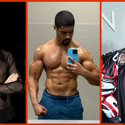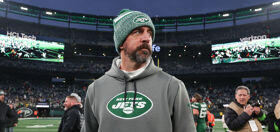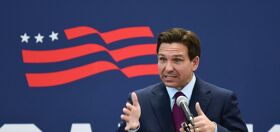
The consumer goods industry is well known for creating a vast array of products for women that really fall into just a few categories: hair, skin, nails, body, fragrance, and hygiene. So how come walking through a Walgreens or Walmart feels like you’ve entered Delhi’s spice market for shower gel and make-up remover? Easy: Because skilled marketing can convince us to spend spend more cash than necessary on luxury-branded items, or feel the need to diversify the number of facial cleansing scrubs, washes, and toners we own but may never use. (It’s okay, you can admit that you buy Pantene because of the shiny hair commercials, and not because of what it does to your hair. Namely, damages it.) So what can we expect from Unilever and P&G in the near future? Same strategy, different consumer group. Yes, they’re coming for the men.
Even though the metrosexual phase has come, at last, to an end, even heteros are still keeping themselves well groomed. They just aren’t getting all gay about it. And the marketers behind these billion-dollar brands that are trying to reach the guy quotient couldn’t do it alone. They’re relying on the best crutches in advertising: stereotypes! Relays AdAge:
P&G has been highlighting the masculinity of its men’s brands, Old Spice and Gillette, amid the high-profile entry of Dove Men+Care. Recent ads from Wieden & Kennedy, Portland, Ore., urge women to get their men to stop using “lady-scented body wash” in favor of Old Spice. An ad for Gillette’s body wash, with a fairly obvious proxy for the new Dove product in the shower, pointedly says, “Just because it says it’s for men doesn’t mean it is.”
“We think frankly a brand grounded in men, where you don’t have to say it’s for men, has a much better chance of winning in the marketplace,” said Ed Shirley, vice chairman of beauty and grooming for P&G.
For its part, Unilever claims it has the leading men’s personal-care brand in categories outside shaving: Axe. (Gillette is the leading personal-care brand overall — including shaving — for men.) And Unilever has captured two-thirds of the growth in men’s grooming over the past five years, said Kathy O’Brien, VP-personal care North America. Gillette, despite its commanding 70%-plus market share in razors and blades, hasn’t been able to easily translate that success into leadership in any other men’s category.
But will the Dove brand, traditionally associated with the fairer sex, really resonate with men? “Many men are already using Dove products, and Unilever has a history of proven success in men’s care,” said Ms. O’Brien.
And then then there’s the oldest of tried and true advertiser strategy: If you give consumers somebody they aspire to be, they will buy the product. That’s why Diddy shills for Ciroc, and Tiger Woods for, well, nevermind. But it also explains why you put this alpha male prototype on television, and it just works.



















Griffin
I was pleasantly surprised that Old Spice chose to use an African-American man as its symbol of male desirability. That’s unusual.
yeahyeah
That guy is hottt!!!
B Damion
Nooo..He’s “F-ing” Hot.
TexTex
Who cares about Tiger? Amway also screws anything that moves, and has ripped off millions of people for several decades, to the tune of 10s of billions of dollars:
Amway is a scam, and here’s why: Amway pays out as little money as they can get away with, so they support the higher level IBOs ripping off their downline via the tool scam.
As a result, about 99% of IBOs operate at a net loss, while the top 1% make several TIMES more from their Amway tool scam than from the Amway products. This was made illegal in the UK in 2008, but our FTC is unable to pull their heads out of their butts to stop it here.
Read about it on my blog, I suggest you start here: http://tiny.cc/D5oJh and forward the information to everyone you know, so they don’t get scammed.
AlfonzoChavez
Textex, forgive me, but I missed the connection between Old Spice and Amway.
Perhaps my opinion here is biased, working for a gay magazine and all, but until they start dropping some dollars on gay media for advertising, I say we stick to brands that ARE spending money on us like Nivea.
lander
Last thing this world needs is more useless chemicals being sold in plastic containers.
Am I the only person unaffected by consumerism left?
fredo777
Am I the only person who doesn’t know why Pantene is supposedly damaging to your hair? I’ve used Pro-V for years + never had any (visible) problems. Hmm…
Edfu
@B Damion: I read that he was a wide receiver for the NFL! First name is Isaiah.
Lukas P.
@fredo777: @lander: Look at the ingredients in your shampoo or “body wash” {a fancy word for liquidish soap}. Compare the top four or five ingredients in the expensive brands and the drugstore brands. Not much difference is there? Same goes for gels/mousse too.
I personally like unscented products and hypoallergenic products. If you want scent, then there’s many a fine cologne out there. I’m not shilling for Dove or Nivea, but their products work for me.
Too much scent covers up the body’s own natural scents/pheromones, which as long as you’re clean, eat okay, and stay healthy, are sexier than anything science can contribute {so far!}.
The big ad campaigns sell sex-appeal. Throw Adidas products on a lousy body and a bad attitude, and you can’t cover up being saggy assed and bitter.
p.s. Men should smell like PIZZA! That’s my idea for a cologne….[lol]. Maybe women should too, I’m not an expert there………
Bitchy Bitch
@fredo777: I’m wondering that as well. WTF Queerty, elaborate much?
@Lukas P.: Ugh, keep your nasty pizza cologne to yourself. That’s disgusting.
@lander: If you dont want to buy a simple product to stop yourself from stinking at the end of the day, then by all means, be my guest. Good hygene obviously isn’t one of your priorities.
Lukas P.
@Bitchy Bitch: Yes, humor is not something in your grasp. Many “differently abled people” have the same difficulty.
Clearly, a career in bagging groceries might be possible for you! Just don’t mix cold foods with hot foods and you may succeed!
Best of luck with that job search.